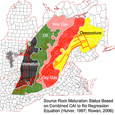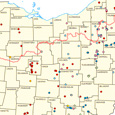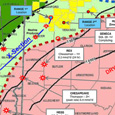How Ohio is Dealing with Radioactive Drilling Waste
Wednesday, December 11, 2013
What is Ohio doing with the radioactive wastes coming from the state’s Utica shale drilling operations? According to a report from WKSU, much of the radioactive material makes its way into Ohio landfills.
NORM vs TENORM
The material in question is low-level, naturally occurring radioactive material present in the brine that comes from the ground during the drilling process. Low-level radioactive material is regulated by the states, giving them jurisdiction over how such things are disposed of.
Read it:
“Asked why state regulation allows most low-level radioactive waste from hydraulic fracturing in Ohio’s Utica shale fields to go into landfills, Tom Stewart of the Ohio Oil & Gas Association says it’s because the radiation level is far below being dangerous.
“A Health Department person told the Kasich administration that you could stand beside a brine truck with a hundred barrels of brine in it for 250 days and you still wouldn’t be exposed to more radiation than in a common dental X-ray.””
Two kinds of radioactive material come from drilling: NORM and TENORM. NORM (Naturally Occurring Radioactive Material) and TENORM (Technically Enhanced NORM) are disposed of in different ways. NORM can be tossed in normal landfills, TENORM cannot.
Now, according to NPR, there’s a push to label all radioactive material from Utica shale drilling as NORM.




